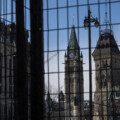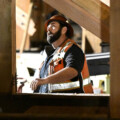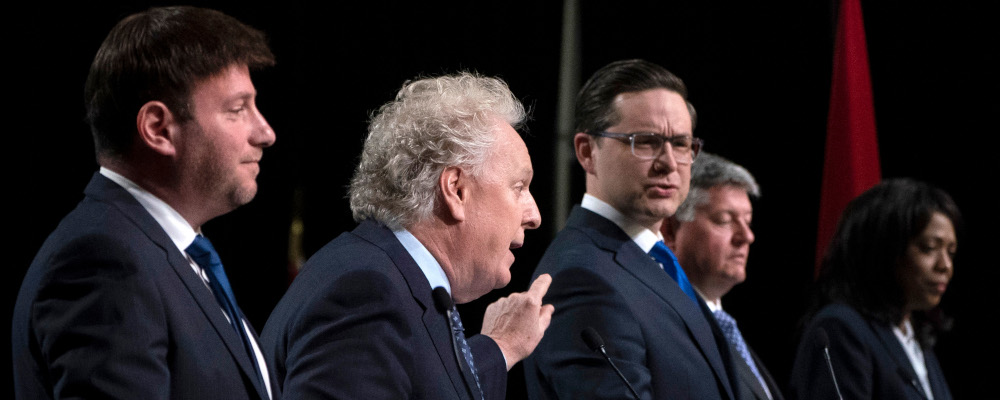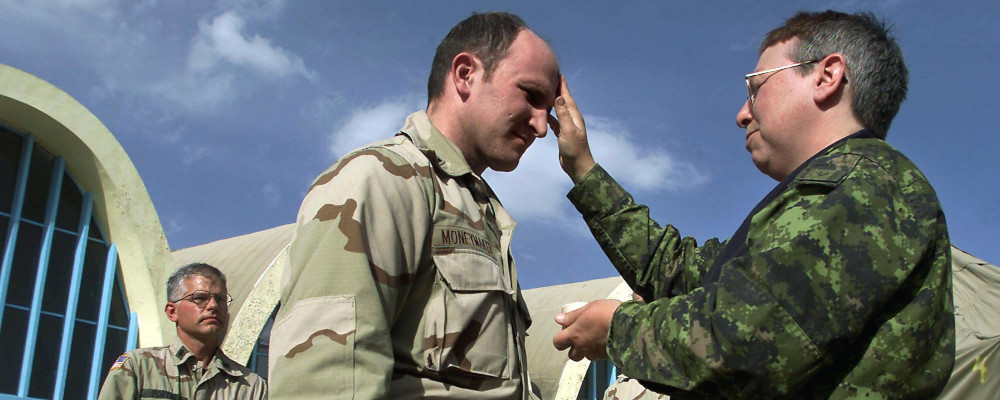The first unofficial CPC leadership debate in Ottawa last week brought out the Victorian spinsters of the Canadian media.
At the usually unshockable Sun tabloid, Brian Lilley deemed the debate “[a]ngry, confrontational and at times bitter” and singled out Pierre Poilievre for being “chippy” and “angry” as well as “petty and sophomoric.”
Over at the Star, Susan Delacourt speaking on behalf of the legacy media, elites, and anything else deemed liberal, sniffed about candidates who would dare to “whip up rage against ‘legacy media,’ elites and anything else deemed ‘liberal.’”
Even the crusty cynics on The Curse of Politics podcast seemed genuinely aghast, joking that they were “still cleaning the blood off the floor from the CPC debate” and gabbling like wide-eyed postulants at a peeler bar that it “was so raw, so raw.”
And the good folks of The Line went, if not quite full Hillary, then at least half-Hillary, accusing Poilievre of “ranging tonally into the, dare we say it, deplorable.”
My question for the Canadian media is, where have you been living for the last decade?
Wherever it was, apparently it didn’t have social media. Compared to an hour scrolling Twitter, what we heard in Ottawa last week was downright genteel. Did our commentariat really think the hyper-partisanship of everyday political discourse could be kept out of our actual political discourse forever?
The CPC debate is hardly the first time we’ve seen no-holds-barred political rhetoric. Trump’s serial indelicacies need no rehearsal, but before Trump there was Barack Obama, who brought the “Chicago Rules”—high-flown rhetoric punctuated by low blows—to national politics.Obama Played by Chicago Rules As Obama once told a crowd in the City of Brotherly Love, “If they bring a knife to the fight, we bring a gun.” Eric Holder—once the nation’s most senior law officer—later echoed his former boss’s street-brawling style: “When they go low, we kick them. That’s what this new Democratic Party is about.”
We’ve seen it in Canada before too. Trudeau’s gratuitous smearing of Canadians who refused to get vaccinated as “racists” and “misogynists” during the last election was straight out of the toxic Twitter playbook. So was his dismissal of those who questioned vaccine mandates as holding “unacceptable views.” Why debate when you can denounce? And if you really want to see the pollution of politics by social media, tune in to the vitriol from the Alberta NDP benches in Edmonton or spend a day on #ableg Twitter. It’s gross enough to make the most defiant libertarian reconsider his commitment to free speech.
The politics of social media was always going to seep into our national politics. There is nothing new about a demotic medium changing both the way a message is delivered and the message itself. If politicians want to be noticed on our screens, they need to speak the way everyone else on our screens speaks. What we saw at the CPC leaders debate was not politics leading our culture astray but politics moving to where our culture already is. If you don’t like it (who does?), you’re going to have to start by changing the culture. Blaming politicians for the tone of politics in a democracy confuses cause and effect. This is on us, not them.
Our society is coarser, angrier, less patient, and more sensitive than it was even a decade ago. Some of this can be blamed on social media’s anger-driven business model (speaking of which, why is no one talking about putting a stop to that, short of Trudeau’s plans to censor legal speech?). But much of it is a reasonable reaction to a hard reality: for the first time in several generations there is a substantial body of Canadians who don’t believe the system works for them. Because it doesn’t.
In 1968, the American political scientist Ted Gurr published a paper called “A Causal Model of Civil Strife: A Comparative Analysis Using New Indices.”A Causal Model of Civil Strife: A Comparative Analysis Using New Indices Gurr believed that civil unrest was related to a psychological condition he called “relative deprivation.” In his stilted academic language, relative deprivation occurs when “actors’ perceptions of discrepancy between their value expectations (the goods and conditions of the life to which they believe they are justifiably entitled) and their value capabilities (the amounts of those goods and conditions that they think they are able to get and keep)” do not align.
In the same year, another American political scientist, Samuel Huntington, published “Political Order in Changing Societies.”Political Order in Changing Societies Like Gurr, Huntington believed that the gap between expectation and satisfaction was a useful predictor of political instability. He added that this instability is related to, and can be exacerbated by, a reduction in social mobility and a hardening of political institutions that makes them less adaptable to social change, less responsive to social needs.
For anyone under 30, the life their parents and grandparents took for granted is a fantasy. The home they grew up in might as well be a fairy tale castle for all the chance they have of being able to afford anything like it. Their jobs are less secure, raising their children is more expensive, and the steady economic growth (with a few blips) of the last 40 years feels increasingly precarious—a Ponzi scheme they joined too late. Between growing frustration at frustrated expectations and the heightened level of social anxiety post-COVID, it would surprising if our politics didn’t become more urgent and more raw.
The protests we have seen so far in Canada have been tame. Even including the Ottawa Freedom Convoy/Occupation, its local offshoots across the country, and the brief (and peacefully dispersed) blockades at several border crossings, we have seen nothing on the scale of civic disruption that France saw during the Gilets Jaune demonstrations, and nothing comparable to the riots that roiled the United States last summer and left a long criminal tail.
If a real protest movement does develop in Canada, we should hope that it is channelled within the political system, rather than against it. The CPC leadership debate may have been a disturbing sight to Canadians accustomed to the sedative tones of CBC political panels, but it was a disturbing democratic sight. This is a good thing. The sparks we saw on stage are preferable to real fires in the streets.
And if popular frustration does occasionally spill over into the streets? Well, that’s nothing new either. Democracy is about more than casting a ballot once every four years. Protest, including disruptive protest within limits, has always been part of democratic politics. From the Peasants Revolt to the Rebellions of 1837, the people always have reserved the right to express their frustration directly, even—or especially—if they are an unpopular minority. The Left used to recognize this. Heck, they used to celebrate it (and, for their favoured causes, they still do.) We should not expect politics to be drained of emotion, nor should we want it to be. Politics should be about what matters to people, and what matters is sometimes worth raising a stink about.
Whatever you think of what the Freedom Convoy became, the complaint that sparked it was not unreasonable. Given the vaccination rate and the unchecked spread of COVID in Canada at the time, it made no sense to require Canadian truckers travelling to and from the United States to be vaccinated. Recognizing this and changing the policy would have taken the wind out of the convoy before it arrived in Ottawa. Showing sympathy for unvaccinated truckers would have cost the federal government nothing (and, because the U.S. had the same rule, it wouldn’t even have changed anything). But by then Trudeau had backed himself into an ideological corner from which even common sense offered no escape.
Nor should we forget that unvaccinated Canadians still cannot travel within Canada by train or plane (which, in a country of our size, effectively means they can’t travel very far at all). And they are subject to a 14-day quarantine if they leave and return to Canada, even though no province requires more than five days of isolation even for a positive test (the U.K., where I am, quietly dropped the requirement to isolate even for a positive test months ago). At this point in the pandemic, these restrictions look less like public health measures and more like petty vindictiveness. Good for the candidates in the debate who said so.
After viewing the passive attitude of the “sheep-like” coal miners of Northern England in 1936, George Orwell concluded bitterly that, “[t]here is no turbulence left in England.”George Orwell: Diaries He believed that a little turbulence—which elsewhere he called “a tug from below” on the ruling class—is a sign of vigour in a democracy. It is especially welcome when the turbulence is motivated by a genuine grievance like the intergenerational injustice unfolding in Canada’s housing market, the unconscionable debt burden the Boomers are leaving for their grandchildren, and punitive travel restrictions on the unvaccinated.
For people on the wrong side of those divides—which adds up to a lot of Canadians—the frustration with the status quo is much deeper and much angrier than most pundits and public officials seem to realize. In the CPC leadership campaign, we are finally seeing politicians recognize this frustration and respond in the language those voters are already using. If you listen to Poilievre’s message about challenging the gatekeepers and reforming our arthritic institutions, and if you take seriously the warnings of Gurr and Huntington, then you’ll see his campaign is an antidote to the problem, not the problem itself.
The media scolds who cluck their tongues and stroke their beards over the incivility of the Canada Strong and Free debate or the stridency of Poilievre’s rhetoric don’t get it. They sound like those old-time campaigners against media indecency who would write sour letters to the radio station if a band blasphemed. I say this as someone with a healthy skepticism of democracy, who believes that we would have been better off without the invention of television, the internet, and the idiot stream of social media, but these critics are living in an alternate reality. The anger is real and the blame lies with the political class who got us here, not with the politicians telling them to wake up and change course.
My advice to the ingenues of the Canadian press corps is to stock up on smelling salts. If Ottawa and Bay Street don’t act soon to address the causes of the present discontent—and there is no sign they will—our society and our politics are about to get a whole lot uglier.
Recommended for You

The Weekly Wrap: It’s time to cut through Chesterton’s Fence and implement sweeping reform in Canada

Has the Left lost its masculine energy?

Ginny Roth: J.D. Vance, Pierre Poilievre, and how they slice their economic pie

David Polansky: As President Biden leaves the race, will the Democratic Party hodgepodge hold?









